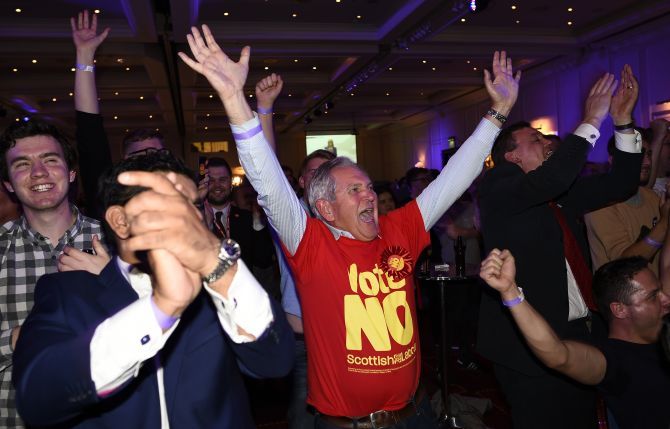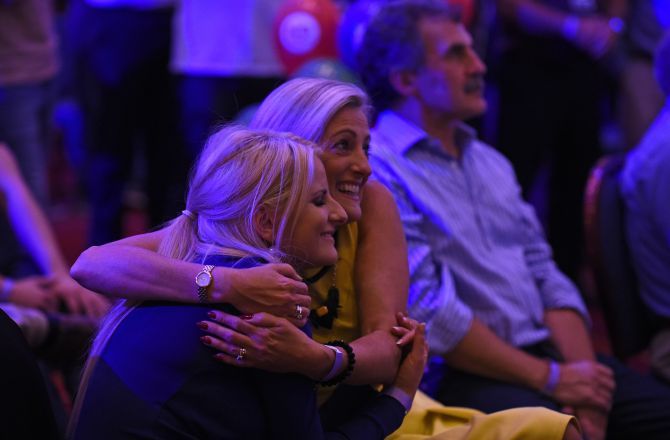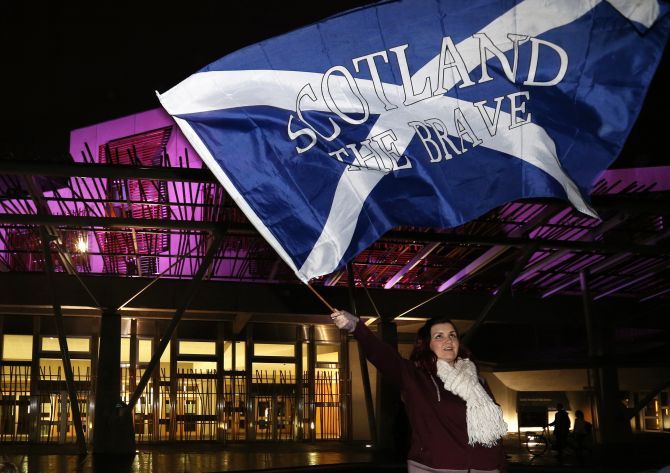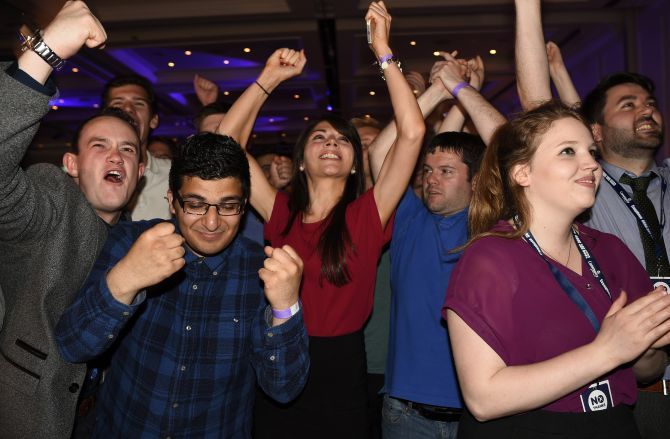
Scottish voters on Friday said a big "No" to independence and decided to stay in the 307-year-old union with England and Wales after a historic referendum that brought out bitter divisions while paving the way for a 'devolution revolution' in the UK.

The pro-independence camp was decisively defeated with over 55 per cent of Scotland voting to remain in the UK. The results were in from all 32 council areas and the "No" side won with 2,001,926 votes over 1,617,989 for "Yes".
The margin of victory for the 'Better Together' campaign -- 55.3 per cent to 44.7 per cent -- was far greater than anticipated by the final opinion polls which said the referendum was on knife edge.

After a bitter campaign with both camps upping the ante in the final weeks ahead of the referendum, turnout was 84.6 per cent -- the highest ever for an election in Britain.
David Cameron declared a "clear result" in the referendum after Scotland voted by a 10.6 per cent margin against ending the 307-year-old union with England and Wales.
The prime minister promised a 'devolution revolution' across Great Britain, including votes on English issues by English MPs at Westminster, as he hailed the Scottish people's decision to remain inside the UK.

"Like millions of other people, I am delighted. As I said during the campaign it would have broken my heart to see our United Kingdom come to an end," a relieved Cameron said in a statement outside his 10 Downing Street office in London.
"Just as the people of Scotland will have more powers over their affairs, so it follows that the people of England, Wales and Northern Ireland must have a bigger say over theirs," he said.

Scotland's First Minister Alex Salmond called for unity and urged the unionist parties to deliver on more powers.
"I accept that verdict of the people and I call on all of Scotland to follow suit in accepting the democratic verdict of the people of Scotland," the leader of the Scottish National Party said.
"Let's not dwell on the distance we've fallen short -- let us dwell on the distance we have travelled," he tweeted.
"My feeling was just crushing, quite devastating," said 16-year-old Charlotte Darroch, who was watching the count in Edinburgh in her school uniform pinned with lots of "Yes" badges and a Scottish flag wrapped around her shoulders.
"No" supporter Louise Fleming, 21, who was watching the count in Edinburgh, said she was "relieved" at the result.
"It's been such a divisive referendum, we have seen the outcome, we can't expect everything to be great tomorrow but the right outcome has occurred," she said.

The vote was the culmination of a two-year campaign and talks will now begin on devolving more powers to Scotland.
The "Yes" campaign scored four big successes – winning 53 per cent in the largest city of Glasgow, 54 per cent in West Dunbartonshire, 57 per cent in Dundee and 51 per cent in North Lanarkshire.
However, the "No" camp was victorious in 26 authorities. It won overwhelmingly in areas where it was expected to do well, including Edinburgh, Aberdeenshire and Borders, but also in areas that could have gone to the "Yes" campaign, including Falkirk, Inverclyde, Eilean Siar and Clackmannanshire.
The president of the European Parliament, Martin Schulz, was the first to react abroad, saying he was "relieved".
"I like a United Kingdom in a united Europe," he said.

Jose Manuel Barroso, the outgoing European Commission President, said it would strengthen the EU.
"I welcome the decision of the Scottish people to maintain the unity of the United Kingdom. This outcome is good for the united, open and stronger Europe that the European commission stands for," he said.
Labour leader Ed Miliband said, "We will deliver on stronger powers, stronger Scottish powers and a stronger Scotland."
"Let us be able to tell our children and our grandchildren that we did not just keep our country together, we changed our country together. That is our mission," he said.
The people of Scotland had been queuing up to register their vote in the historic referendum on Thursday to decide their future. They had a simple "Yes" or "No" choice to the question: "Should Scotland be an independent country?"

Nearly 97 per cent of the electorate, adding up to 4,285,323 people, were registered to vote at 2,608 polling places across the country.
Alistair Darling, the leader of the 'Better Together' campaign, said the victory was a "momentous day not only for Scotland but for the United Kingdom as a whole".
Prime Minister Cameron is set to outline plans for Scotland to have draft legislation published on its power on tax, spending and welfare by January.
But he said the focus must also be on the rest of the UK and what each nation can expect in the future, including how funding is allocated from the central government.
"In Wales, there are plans to give the Welsh government and the assembly more powers and I want Wales to be at the heart of the debate on how to make our United Kingdom work for all our nations," Cameron said.
Deputy Prime Minister Nick Clegg said "this referendum marks not only a new chapter for Scotland within the UK but also wider constitutional reform across the Union."
The Pound Sterling jumped, reaching a new two-year high against the Euro in Asian trading hours, as the referendum was called in favour of the "No" vote.










